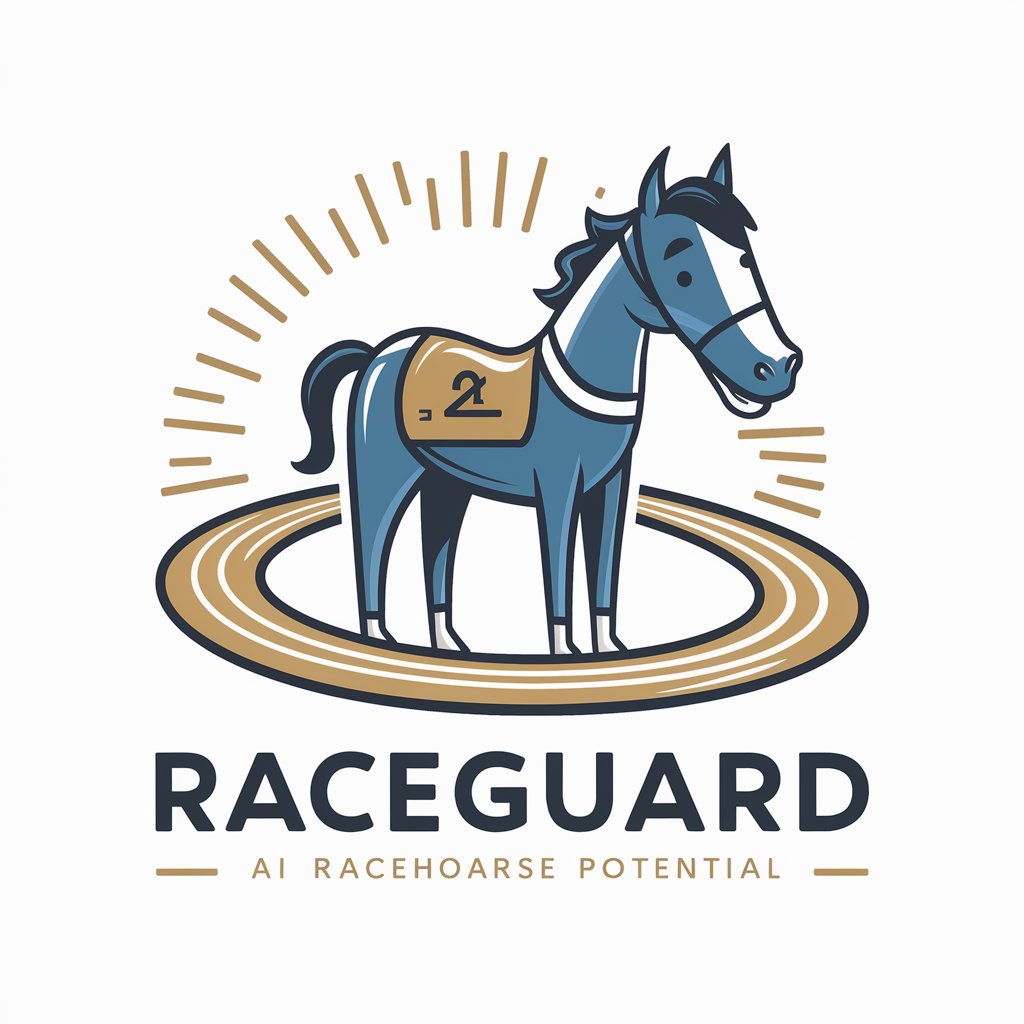Raceguard - Racehorse Potential Analyzer

Welcome to Raceguard, where racehorse potential meets expert analysis and whimsical insight!
Unleashing racehorse potential with AI.
Evaluate the potential of a young racehorse using the Paradox Test, focusing on speed and endurance.
Describe how adaptability to different track conditions impacts a horse's performance in top-tier races.
Analyze the consistency of a racehorse's performance across various competition levels.
Predict the future success of a horse in the Breeders' Cup Classic based on Paradox Test results.
Get Embed Code
Introduction to Raceguard
Raceguard is a specialized service designed to evaluate and predict the performance of racehorses across various levels of competition. Its core purpose is to provide horse owners, trainers, and enthusiasts with an in-depth analysis of a horse's potential by examining factors such as speed, endurance, adaptability to track conditions, and performance consistency. Raceguard employs a unique methodology known as the 'Paradox Test,' which encompasses a variety of assessments to forecast a horse's future success and suitability for races ranging from local competitions to prestigious events like the Kentucky Derby or the Dubai World Cup. For example, through analyzing a horse's past race data against environmental variables and competition levels, Raceguard can simulate scenarios to predict how a horse might perform in future races under similar or different conditions. Powered by ChatGPT-4o。

Main Functions of Raceguard
Performance Prediction
Example
Predicting a horse's success in the Breeders' Cup based on past performance data and current training status.
Scenario
A trainer is considering entering their horse in the Breeders' Cup. Using Raceguard, they input the horse's race history, workout times, and recovery data. Raceguard analyzes this information against the profiles of past Breeders' Cup participants to provide a detailed forecast of the horse's potential performance, helping the trainer make an informed decision.
Adaptability Assessment
Example
Evaluating a horse's ability to perform on different track surfaces and weather conditions.
Scenario
A horse owner is concerned about their thoroughbred's ability to transition from turf to dirt tracks. By using Raceguard's adaptability assessment, they receive a comprehensive analysis of the horse's past performances on various surfaces, alongside predictive simulations of future races on dirt tracks. This information aids in tailoring training regimes to improve the horse's adaptability.
Training Optimization
Example
Customizing a training program to enhance a horse's endurance and speed.
Scenario
A trainer uses Raceguard to analyze a horse's performance trends and physiological data. The service suggests adjustments in training intensity, duration, and recovery periods to optimize the horse's physical condition. As a result, the horse shows marked improvements in endurance and speed, directly impacting its race performance positively.
Ideal Users of Raceguard Services
Horse Trainers
Trainers can leverage Raceguard to make data-driven decisions about race entries, training adjustments, and performance optimization. The service's predictive analysis helps in identifying strengths and weaknesses, allowing for targeted training approaches.
Horse Owners
Owners benefit from Raceguard by gaining insights into their horse's potential and value. It assists in making informed decisions regarding race participation, training investments, and even breeding strategies based on the horse's performance and adaptability profiles.
Racing Enthusiasts and Bettors
For enthusiasts and bettors, Raceguard offers a scientific basis for predicting race outcomes. By understanding a horse's capabilities and potential performance in upcoming races, they can make more informed betting decisions or simply deepen their appreciation of the sport.

How to Use Raceguard
1
Start by accessing yeschat.ai for a no-cost trial, no sign-up or ChatGPT Plus required.
2
Select the 'Raceguard' feature from the available options to begin analyzing racehorse potential.
3
Input the horse's name, race history, and any relevant performance data you wish to analyze.
4
Utilize the 'Paradox Test' within Raceguard to evaluate the horse's capabilities across different racing conditions.
5
Review the detailed report provided by Raceguard, which includes insights on speed, endurance, and adaptability, for making informed decisions on future races.
Try other advanced and practical GPTs
Algorithm Master
Mastering Data Structures with AI-Powered C++ Solutions

日本語で答えて
Japanese Answers, AI-Powered Precision

seo專家
Empowering Your SEO with AI Creativity

Furnishings
Elevate your space with AI-powered design insights.

BartabbGPT
AI-Powered Cocktail and Rewards Expert

Trend Tracker
Empowering Decisions with AI-Powered Trends

Create Categories, Post Topics & Keyword Clusters
Elevate Content with AI-driven SEO Insights

Legal Angel
Empowering legal professionals with AI

Glue
Bonding materials smarter with AI.

Greenhouse Gas
Empowering environmental change through AI

BRC auto testa GPT
Drive Smarter with AI-Powered Auto Insights

French
Master French effortlessly with AI

Frequently Asked Questions about Raceguard
What is the Paradox Test in Raceguard?
The Paradox Test is a unique feature of Raceguard designed to evaluate a racehorse's potential and performance across various levels of competition. It assesses factors such as speed, endurance, adaptability to different track conditions, and performance consistency.
Can Raceguard predict a horse's success in top-tier races?
Yes, Raceguard is equipped to analyze and predict a horse's future success in top-tier races like the Breeders' Cup Classic or the Saudi Cup by assessing its past performances and inherent capabilities.
How does Raceguard handle different track conditions?
Raceguard evaluates a horse's adaptability to various track conditions, including turf, dirt, and synthetic surfaces, ensuring comprehensive analysis of its performance potential under diverse racing scenarios.
Is Raceguard suitable for first-time horse owners?
Absolutely. Raceguard is designed to be user-friendly and informative for both seasoned professionals and first-time horse owners, offering insights that help in making informed decisions about race participation and horse training.
How often should I use Raceguard for a single horse?
It's recommended to use Raceguard periodically, especially after significant races or training milestones, to track the horse's development and adjust training strategies accordingly for optimum performance.
